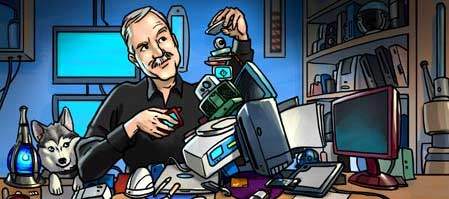Sometimes it is rather interesting to observe the moves a company makes and analyze the real story behind major decisions.
If you recall, McAfee has been part of Intel for some time now. However, aside from one blatantly obvious joint project you wouldn’t know it – at least not from the presentations and briefings I’ve attended in Santa Clara. And even when the subject turned to security topics, it seemed as if the two firms weren’t really properly aligned.

Of course, one upside to not executing a full merger is reducing the likelihood the acquired company will be completely destroyed. Yet, the downside is unresolved turf issues between the two entities, which could significantly impede progress.
Fortunately, yesterday’s staffing changes effectively replaces McAfee’s CEO with one of the strongest, no-nonsense executives in Intel’s stable. Clearly, Intel is moving aggressively to accelerate projects it deems critical.
CEO’s Suck at Being Subordinates
David DeWalt – who is certainly well regarded as a CEO – effectively went from someone who reported to McAfee’s board and shareholders to a senior Intel employee in a post-merger world.
This is a transition most CEOs are incapable of adapting to and typically don’t want to make at all. Now, all of this would have been just dandy if McAfee was going to be like a number of Dell subsidiaries, meaning, that it had been purchased primarily for its product set, but it wasn’t.
Rather, McAfee was snapped up for its mobile expertise and was supposed to be skillfully deployed as a competitive tool in Intel’s campaign against ARM in the mobile arena. From a priority standpoint, the joint Intel/McAfee effort remains quite high – and not McAfee’s current product lines.
This means McAfee’s top spot needs to be filled by an individual who can deftly (and diplomatically) coordinate between the two firms, rather than someone who excels in moving existing McAfee lines. And DeWalt, as good as he is, just simply wasn’t the right guy for this job.
Protecting Image and Creating Synergy
One thing Santa Clara could have done is named an Intel executive as CEO. However, this often has the effect of demoralizing the workers at an acquired company, while creating conflicts between the CEO and high-level execs underneath him or her who had aspired to the job.
Instead, Intel promoted Michael DeCesare and Todd Gebhart as co-presidents – which put them at the top of McAfee. But because they are co-presidents, the two split the authority of the job more clearly – putting the person they reported to at Intel in the drivers seat.
In short, ownership and control of the existing product lines remains in McAfee hands, while the folks who receive external credit for results are McAfee employees. Nevertheless, the person who is clearly calling the strategic shots, as well as coordinating and prioritizing, is none other than Renee James.
Now, James is a bit of a legend at Intel and is well known as one of their strongest executives. Training under the legendary Andy Grove, she has a reputation of a no-nonsense executive, and is believed to be one of the folks that might one day run Intel – the only woman I know of on that rather short list.
If there are people in Intel better qualified to lead this effort, well, I’m not aware of them. Putting James at the head of this initiative both exemplifies its importance to Intel and increases the likelihood it will be successful.
Wrapping Up: Artfully Done
It really isn’t often I see a merger handled quite this artfully. By making this executive change, Intel has demonstrated the concept of “minimum necessary change” – a motto those involved with mergers and acquisitions have learned to live by.
Essentially, this means minimizing the impact of an acquisition, while focusing on the intended benefits. This allows a corporation to substantially reduce collateral damage and increase the probability of success.
True, the changes at the top have very little impact on McAfee’s day to day operations, but they should result in significant benefits for Intel. And that’s the way these things should be done.






